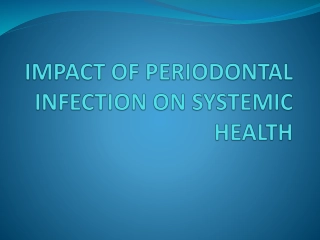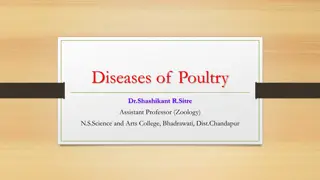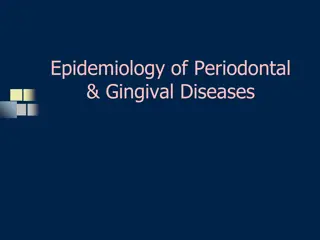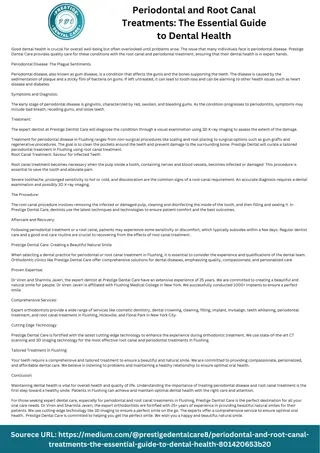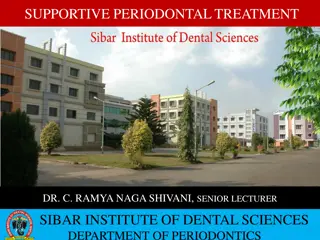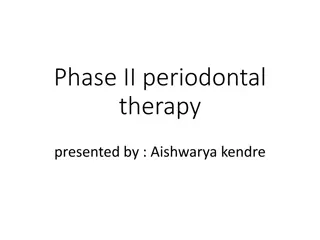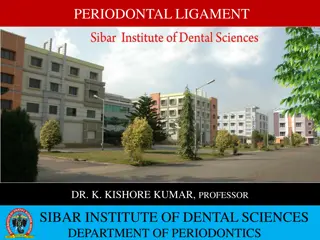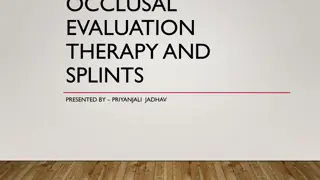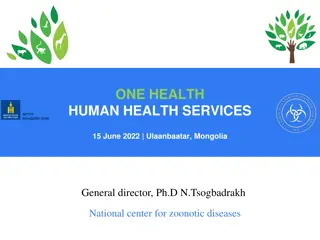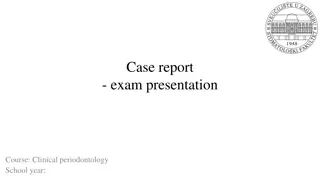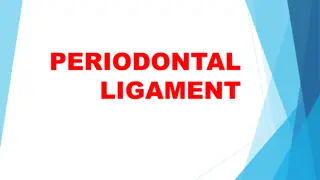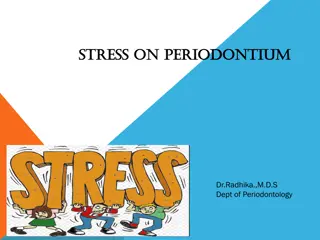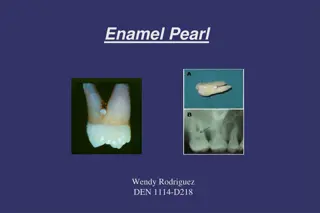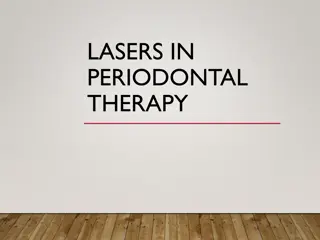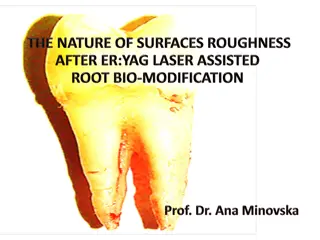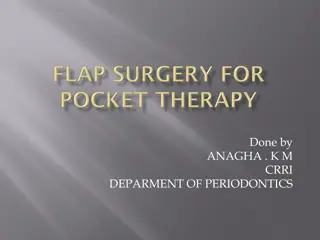Understanding Periodontal Diseases and Their Management
Periodontal diseases affect the supporting structures of teeth and can be caused by bacterial plaque accumulation and host immunological factors. Types of periodontal diseases include gingivitis, herpetic gingivostomatitis, acute necrotising gingivitis, periodontitis, and aggressive periodontitis. Prevention involves good oral hygiene, antimicrobial mouthwashes, regular dental check-ups, and managing risk factors like diabetes, puberty, pregnancy, and bruxism.
Download Presentation

Please find below an Image/Link to download the presentation.
The content on the website is provided AS IS for your information and personal use only. It may not be sold, licensed, or shared on other websites without obtaining consent from the author. Download presentation by click this link. If you encounter any issues during the download, it is possible that the publisher has removed the file from their server.
E N D
Presentation Transcript
PEriodontal Diseases Journal of Oral Health and Dental Management
INTRODUCTION Periodontology is the specialty in dentistry that deals with the study of structures supporting teeth, diseases conditions and their effective management. The supporting structures include gums (gingiva), cementum, periodontal ligament and alveolar bone. The causes of periodontal diseases can be the bacterial plaque accumulation as well as some host immunological factors which lead to the destruction of the supporting bones around the teeth.
Types of Periodontal Diseases Gingivitis: Gingivitis refers to inflammation of the gum of any cause. However, it is most often associated with plaque. Herpetic gingivostomatitis: This is a condition caused by primary infection with the herpes simplex virus, often by contact with someone who has cold sores. It predominantly (but not exclusively) affects toddlers and young children and is characterised by an acute onset of fever, malaise, pain and ulceration of both gingiva and oral mucosa
Acute necrotising gingivitis: Also known as Vincent's gingivitis or trench mouth, this is a progressive, painful, acute bacterial infection of the gums. The bacteria involved tend to be those already present in the mouth and it is predominantly associated with anaerobic flora.
Periodontitis: Untreated gingivitis can advance to periodontitis which is an inflammation of the periodontal ligament (which attaches the tooth to the bone) and bone. Toxins produced by the bacteria in plaque irritate the gums and stimulate a chronic inflammatory response in which the tissues and bone that support the teeth are broken down and destroyed
Aggressive periodontitis: A severe form of periodontitis (formerly known as early-onset periodontitis) occurs in patients (usually under the age of 35) who are otherwise clinically healthy. It tends to be associated with Actinobacillus actinomycetemcomitans.
Prevention of Periodontal Disease Prevention of gingivitis and periodontal disease requires good oral hygiene, possible use of antimicrobial mouthwashes and the regular review of a dentist.This is particularly true in those with diabetes who are more likely to develop infections of the gum and periodontal disease. Other risk factors include puberty and pregnancy as well as bruxism (clenching and grinding of teeth) which can put stress on the structures around the teeth and loosen them. Smoking is also a significant factor in the development and progression of periodontal disease; this is another opportunity to think about stopping smoking.
Editors Biography: Dr. Nikola Angelov is a Professor and Chair of the Department of Periodontics at UT Health School of Dentistry, Department of Periodontics and Dental Hygiene, in Houston, Texas. Dr. Angelov was born in Skopje, Macedonia in 1968. He earned his DDS, MS and PhD degree from the University St. Cyril and Methodius and has been teaching for the Department of Oral Pathology and Periodontology in Macedonia since 1993. In 2001, he received a postdoctoral fellowship at the National Institute of Health, National Institute of Dental and Craniofacial Research (NIH/NIDCR). At NIH/NIDCR, Dr. Angelov successfully developed a new model of oral mucosal wound healing and was also involved in collaborative clinical studies clinical trial evaluations, as well as other studies. In 2004, Dr. Nikola Angelov joined the faculty at Loma Linda University School of Dentistry, Department of Periodontics where he achieved full Professorship and served as a Director of the Pre-Doctoral Periodontics Clinic, as well as Director of the Undergraduate Program in Periodontics, until 2013. He joined UT Health School of Dentistry in Houston in 2013, as a Professor and Chair. Dr. Angelov also holds an U.S. Certificate of Specialty in Periodontics and is licensed to practice dentistry in two U.S states. In 2008, Dr. Angelov received the prestigious annual Educator of the Year Award from the American Academy of Periodontics, for outstanding results in teaching in the area of Periodontics. Dr. Angelov has several other academic awards and is actively involved in teaching and research. His research area includes oral infection and immunity, mucosal wound healing, periodontal microbiology, as well as dental implants. Dr. Angelov has extensively published in peer review articles, has been invited speaker to prominent professional and research meetings. He is a member of numerous professional societies in the USA and abroad and serves on editorial and advisory Boards of several journals.
Research Interests: Gene Array Analysis of Periodontally Involved Tissues The Zirkonium Implant-Bone Interface Gingipain-Induced Caspase-1 Activity in Bovine Coronary Artery Endotelial Cells Biostimulative laser in Treatment of Periodontal Diseases Biomarkers for HPV-Associated Head and Neck Cancers The involvement of Th17 Cells and Related Cytokines in Periodontal Disease


